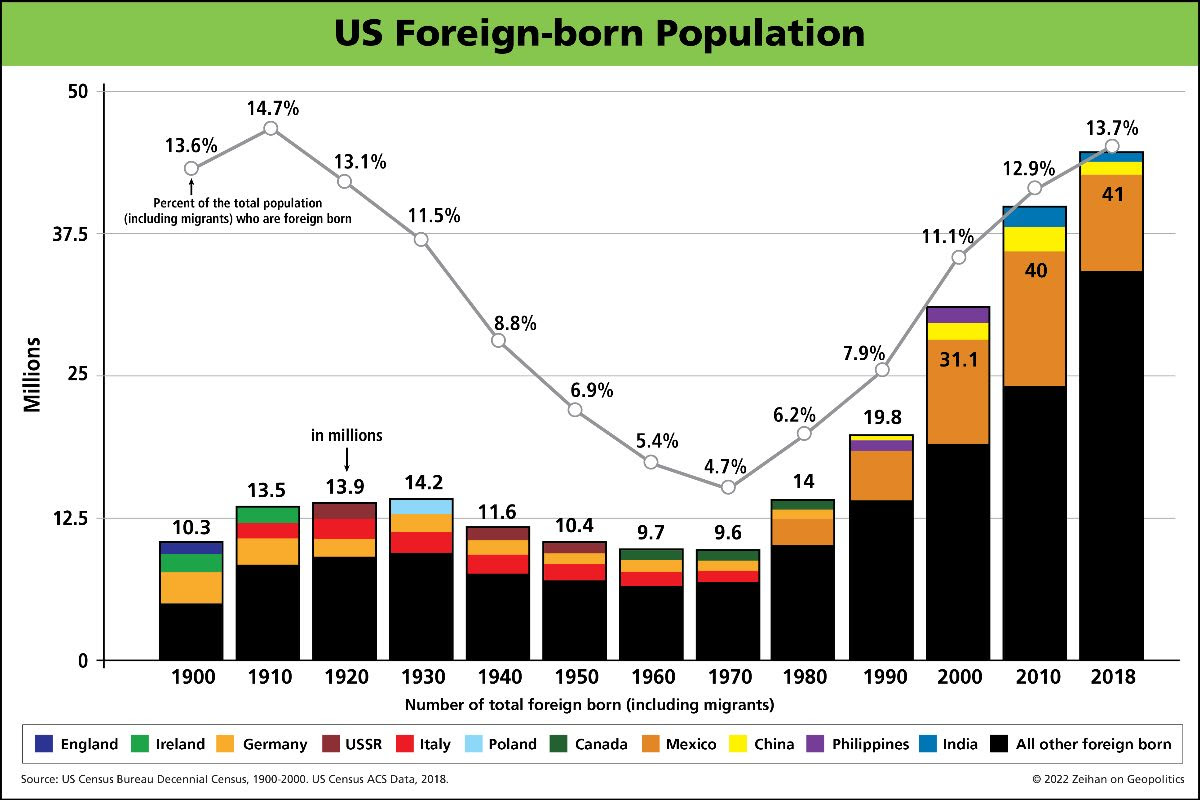My fourth book, The End of the World Is Just the Beginning: Mapping the Collapse of Globalization is scheduled for release NEXT WEEK (!) on June 14. Immigrants and in-migration are always touchy topics. Allow me to present an excerpt from my upcoming book that is certain to make all Americans – and Mexicans – wince at least once.
In-migration to the United States hit a relative historical low in the 1970s—the decade in which America’s Boomers came of age. For Boomers—an overwhelmingly white demographic—their primary experience with interracial politics was the civil rights movement, a movement that involved people who were already here at a time when the Boomers were young and politically liberal.
In-migration then rose steadily until reaching a near-historical high (again, in relative terms) in the 2010s, at which point the Boomers were nearing retirement and in doing so becoming politically . . . stodgy. In each and every decade as the Boomers aged, the largest single immigrant group was always Mexican. In the minds of many Boomers, Mexicans have long been not simply the “other,” but the “other” that has arrived in ever-larger numbers. A big reason why so many Boomers have been so supportive of nativist politicians such as Donald Trump is that their feelings of shock at the pace of change in American society is not a collective hallucination. It is firmly backed up by reality. This is one piece of the kaleidoscope of why American politics has turned so sharply insular in the 2010s and early 2020s.

But regardless of what you think about Boomers or Mexicans or race or trade or assimilation or borders, there are a couple of thoughts to keep in mind:
First, Mexicans are already in the United States. Whether you’re concerned with what American culture feels like or what the labor market looks like, the great Mexican wave has not only come, it is over. Net migration of Mexicans to the United States peaked in the early 2000s and it has been negative for twelve of the thirteen years since 2008. Just as industrialization and urbanization pushed down birth rates in the developed world, the same process has begun in Mexico, just a few decades later. Today’s Mexican demographic structure suggests it will never again be a net large-scale contributor to American migration. Most of the big migrant flows into the United States since 2014 have instead been from the near-failed Central American states of Honduras, El Salvador, and Guatemala.
Second, even among the most nativist strains of American political thinking, room has been found for Mexicans. In just two years, none other than Donald Trump went from openly condemning Mexican migrants as rapists and “bad hombres” to embracing Mexico in trade and security deals that took bilateral relations to their friendliest and most productive in the history of both republics. Part and parcel of Trump’s renegotiation of the NAFTA accords were clauses that expressly aim to bring manufacturing back to North America. Not to the United States specifically, but to any signatory of the accords. Team Trump added those clauses with Mexico expressly in mind.
On the other side of the equation, Mexican-Americans are turning nativist. The demographic in the United States that consistently polls the most anti-migration is not white Americans, but instead (non-first-generation) Mexican-Americans. They want family reunification, but only for their own families. Never forget that anti-migrant, build-the-wall Donald Trump carried nearly every county on the southern border when running for reelection in 2020.
Here at Zeihan On Geopolitics we select a single charity to sponsor. We have two criteria:
First, we look across the world and use our skill sets to identify where the needs are most acute. Second, we look for an institution with preexisting networks for both materials gathering and aid distribution. That way we know every cent of our donation is not simply going directly to where help is needed most, but our donations serve as a force multiplier for a system already in existence. Then we give what we can.
Today, our chosen charity is a group called Medshare, which provides emergency medical services to communities in need, with a very heavy emphasis on locations facing acute crises. Medshare operates right in the thick of it. Until future notice, every cent we earn from every book we sell in every format through every retailer is going to Medshare’s Ukraine fund.
And then there’s you.
Our newsletters and videologues are not only free, they will always be free. We also will never share your contact information with anyone. All we ask is that if you find one of our releases in any way useful, that you make a donation to Medshare. Over one third of Ukraine’s pre-war population has either been forced from their homes, kidnapped and shipped to Russia, or is trying to survive in occupied lands. This is our way to help who we can. Please, join us.








